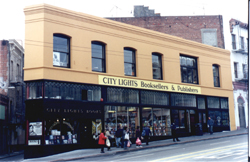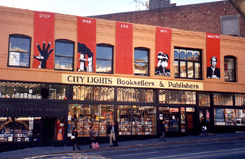- Categories:
City Lights Celebrates 50 Illustrious Years
Often booksellers are called to do more than sell books. They sometimes have to protect them, as well as the rights of readers. One independent bookseller that has historically been a stalwart protector of freedom of expression is San Francisco's inimitable City Lights Bookstore, which is celebrating its golden anniversary this month.
 |
|
Photo: City Lights Bookstore
|
To commemorate, the bookstore closed Columbus Avenue, where it's located, and hosted a lively street festival. "You should have been there. It was an amazing celebration," said Nancy Peters, co-owner since 1983 and staff member since '71. "There was a 'Poetry Dance' to benefit the City Lights Foundation, and people were dancing in the street."
There was also an all-star author reading including co-owner/poet Lawrence Ferlinghetti, Anne Waldman, Guillermo Gomez-Pena, Jack Hirschman, and Michael McClure. "We even had an orchestra," said Peters. "And a slide show with selections of the 90,000 pictures from [Allen] Ginsberg. There were photographs of the whole literary scene: Larry Rivers, Jack Kerouac, Gregory Corso. We showed pictures of the history of City Lights from the '50s to the present -- writers, people who visited."
It was a party for the entire literary community and a chance to honor Ferlinghetti, who contributed so much to it. Ishmael Reed had this to say of him, "A writer himself, Lawrence Ferlinghetti has not only shepherded the careers of many outstanding writers, but there seems to be no end to the shelf life of [his] many literary classics, some of which outlasted their critics. He has not only been a player during one of the most exciting, democratic and innovative periods in American writing; he helped to define it."
The championing of literature was part of Ferlinghetti's mission for City Lights from its very beginning. He and his business partner Peter D. Martin started with a plan to create a "literary meeting place," a gathering place for intellectuals. The publishing branch, which was founded two years after the bookstore, furthered the philosophy of supporting cutting-edge literature and books on important social and political issues. This commitment became perhaps more dramatically and famously manifest when Ferlinghetti published Ginsberg's "Howl" and was subsequently arrested on obscenity charges. When ACLU attorney Al Bendich successfully defended Ferlinghetti and his independent press, the well-known trial paved the way for other writers like Henry Miller and William Burroughs.
 |
|
Photo: City Lights Bookstore
|
City Lights devotedly continues the Beats' "legacy of anti-authoritarian politics and insurgent thinking." One of the more recent public incarnations of this legacy is the banners that hang from the second floor of the 1909 building housing City Lights. Recent banners have borne messages like "Dissent is not un-American" and a quote from Pablo Neruda: "Tyranny cuts off the head that sings, but the voice at the bottom of the well returns to the secret springs of the earth and out of the darkness rises up through the mouth of the people."
Peters discussed the role of activist often adopted by independent booksellers: "The life of a civilization is carried in its books. Books matter, and so the bookseller is necessarily at the epicenter of the struggle for democratic access to ideas. With media ownership shrinking, we, at City Lights, feel that we play a role in not only defending First Amendment rights if forced to do so, but in providing books with progressive perspectives and analyses that are not popular in today's political climate."
Peters got into the bookstore business because, she said, she "spent most of my waking life in bookstores. From the age of two, I've been hanging out in libraries and bookstores. And I've worked in both, with a great run at the University of Washington bookstore during my student days. After being at City Lights for 12 years, I knew I wanted to be here forever. As Ferlinghetti's sign over the entrance says: 'Abandon All Despair, Ye Who Enter Here.'"
That epicenter of activism and independence is, of course, reflected on the shelves, with sections entitled "Stolen Continents," which includes books on Native Americans; "Muckraking," housing authors like Noam Chomsky; and "Topographies," which focuses on the influences of technology on the body.
The relatively small space itself seems larger than its 2,200-square-feet, explained staff member Paul Yamazaki, who joined City Lights in 1970. "The building comes to a point, like the prow of a ship. So there are few right angles, and it feels much bigger."
In all of City Lights' sections, there is strong emphasis on staff contributions. Said Peters, "Every staff member takes part in selecting galleys to read and new books." Staff picks are posted in the main literature section. And all the 76 lists are displayed in the hardcover nonfiction section. Yamazaki said the 76 lists were a "great way to get combined forces of independents around the country" and that they've helped demonstrate to commercial publishers that "independents are still a powerful force" in bookselling.
One of the larger challenges facing City Lights is "keeping the reading public aware of independent bookstores and independent businesses in general," said Yamazaki. "It's the hallmark of what makes a community."
Certainly City Lights has become one of the most renowned bookstores of the literary community, though this was perhaps unanticipated in '53 when the bookstore was 350-square-feet. Said Ferhlingetti, "After standing on the same street corner for 50 years, I've realized City Lights is a way of life, not a business." --Karen Schechner

